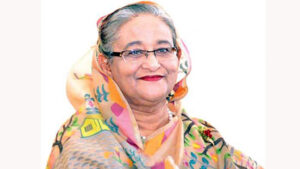 Sheikh Hasina’s Homecoming Day, observed on May 17th each year, commemorates her return to Bangladesh in 1981 after years of exile following the assassination of her father, father of the nation Bangabandhu Sheikh Mujibur Rahman, who was also a prominent political figure in Bangladesh. Sheikh Hasina, the current Prime Minister of Bangladesh, is the daughter of Sheikh Mujibur Rahman and one of the most influential leaders in the country’s history. After the assassination of her father and several family members in 1975, she spent nearly six years in exile in India and Europe.
Sheikh Hasina’s Homecoming Day, observed on May 17th each year, commemorates her return to Bangladesh in 1981 after years of exile following the assassination of her father, father of the nation Bangabandhu Sheikh Mujibur Rahman, who was also a prominent political figure in Bangladesh. Sheikh Hasina, the current Prime Minister of Bangladesh, is the daughter of Sheikh Mujibur Rahman and one of the most influential leaders in the country’s history. After the assassination of her father and several family members in 1975, she spent nearly six years in exile in India and Europe.
On May 17, 1981, Sheikh Hasina returned to Bangladesh, where she eventually rose to prominence in politics. She became the President of the Awami League, one of the country’s major political parties, and has served as Prime Minister multiple times since 1996.
Throughout her political career, Sheikh Hasina has focused on various issues such as economic development, social welfare, women’s empowerment, and education. Under her leadership, Bangladesh has made significant progress in poverty reduction, infrastructure development, and healthcare.
Sheikh Hasina’s Homecoming Day holds great significance in the history of Bangladesh and for her supporters for several reasons:
1. Symbol of Resilience: Sheikh Hasina’s return to Bangladesh after years of exile symbolizes her resilience and determination to continue her father’s legacy despite adversity. Her willingness to return to her homeland and engage in politics despite the risks demonstrates her commitment to her country and its people.
2. Political Milestone: Sheikh Hasina’s Homecoming Day is pivotal in Bangladeshi politics. Her return paved the way for her to assume leadership roles within the Awami League and eventually become the Prime Minister of Bangladesh. This day is a reminder of her political journey and impact on the country’s political landscape.
3. Historical Legacy: The day also honors the legacy of Sheikh Mujibur Rahman, Bangladesh’s founding father, who was assassinated in 1975. As his daughter, Sheikh Hasina’s return to Bangladesh is seen as a continuation of his vision for the country and a commitment to fulfilling his goals for the nation.
4. Inspiration for Women’s Empowerment: Sheikh Hasina’s leadership as a woman in a predominantly male-dominated political arena inspires women in Bangladesh and worldwide. Her Homecoming Day is a celebration of her achievements as a female leader and a reminder of the importance of women’s empowerment and gender equality.
5. National Unity and Progress: The observance of Sheikh Hasina’s Homecoming Day is also a moment for Bangladeshis to unite and reflect on the country’s progress under her leadership. It is an opportunity to celebrate achievements in various sectors, such as economic development, social welfare, and infrastructure improvement.
Sheikh Hasina’s Homecoming Day symbolizes her journey and represents a continuation of her father, Sheikh Mujibur Rahman’s dreams and aspirations for Bangladesh. Sheikh Mujibur Rahman, often called the “Father of the Nation,” envisioned a prosperous, democratic, and developed Bangladesh. Sheikh Hasina, following in her father’s footsteps, shares a similar ideology and has worked towards realizing his vision since her return to Bangladesh on May 17, 1981.
Under Sheikh Hasina’s leadership, Bangladesh has seen significant development and progress in various areas, aligning with her father’s dreams for the nation. Here are some key areas where Bangladesh has made strides since Sheikh Hasina’s Homecoming Day:
1. Economic Development: Sheikh Hasina’s government has focused on promoting economic growth and development in Bangladesh. The country has experienced steady economic growth, with sectors such as textiles, agriculture, and information technology playing a crucial role in driving the economy forward.
2. Infrastructure Improvement: Significant investments have been made in infrastructure projects such as roads, bridges, ports, and power plants. These developments have enhanced connectivity, facilitated trade, and improved the overall quality of life for the people of Bangladesh.
3. Social Welfare Programs: Sheikh Hasina has prioritized social welfare programs to reduce poverty, improve healthcare, and expand access to education. Initiatives such as the Prime Minister’s Education Assistance Trust and the Digital Bangladesh campaign have improved the lives of millions of Bangladeshis.
4. Women’s Empowerment: Sheikh Hasina has strongly advocated for women’s empowerment and gender equality. Her government has implemented policies to promote women’s rights, increase women’s participation in the workforce, and combat gender-based violence.
5. Environmental Sustainability: Bangladesh faces environmental challenges like climate change and natural disasters. Sheikh Hasina has proactively addressed these issues, implementing measures to mitigate the impacts of climate change and promoting environmental sustainability.
By working to fulfill her father’s dreams for a prosperous and democratic Bangladesh, Sheikh Hasina has made significant contributions to the country’s development and progress. Her commitment to inclusive development, social justice, and national unity reflects the values instilled by her father and continues to shape the trajectory of Bangladesh’s growth. Sheikh Hasina’s Homecoming Day serves as a reminder of this legacy and the ongoing efforts to build a better future for the people of Bangladesh.
-Writer

Dr. Fakhrul Islam Babu
Vice President
Bangladesh Awami League
Hong Kong
